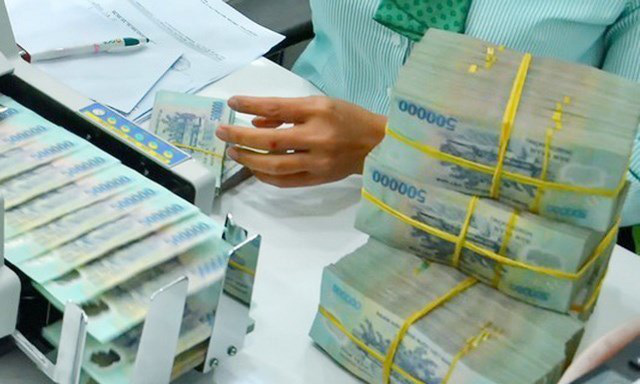
State Bank of Vietnam Deputy Governor Dao Minh Tu at a recent conference asked four state-owned banks and 12 joint stock banks to continue easing lending interest rates for existing loans in July.
The Vietnam Young Entrepreneurs’ Association has asked the Prime Minister for help, saying that the pandemic has seriously affected their production and business activities.
It said that enterprises had to scale down production in the last year, or suspend operation. The current situation is even worse because of the fourth wave which has larger scale and bigger impact than the previous three waves. Its member enterprises have reached the limits of their tolerance and many enterprises cannot pay bank debts on schedule.
The association has proposed a series of solutions to support enterprises hit by Covid-19. It wants a 2 percent interest rate cut on all outstanding loans of enterprises for at least one year, and an additional 1.5-2 percent interest rate cut on new loans.
Hoang Van Vinh, Chair of the Nha Trang Tourism Association, said local tourism firms have become ‘paralyzed’. However, enterprises still have pay a high interest rate of 10.5 percent and banks refuse to ease the interest rates of existing loans.
Vinh said bank loan interest rates have become a dangerous burden on businesses. They want banks to ease the interest rates for outstanding loans to help them overcome current difficulties.
Some businesses confirmed that banks have reduced interest rates for some loans. The interest rates of long-term loans have been eased by 1-1.5 percent from 11-13 percent per annum.
However, the current interest rates are still high, over 10 percent per annum, which is unbearable to businesses amid the pandemic.
A transport firm in Hanoi got a 4-year loan from a joint stock bank to buy cars in mid-2019. The interest rate for the first year was 8.7 percent. However, the interest rates for the following years are higher.
When the Covid-19 pandemic broke out, the bank agreed to cut the interest rates by 1.5 percent per annum. However, the current interest rate of 10.5 percent is still too high for a business which has been seriously affected.
Interest rate still high
| At present, businesses in non-priority fields have to pay 7.5 percent for 6-month loans. However, the interest rate will be raised after three months to 8.5-9 percent. |
At present, businesses in non-priority fields have to pay 7.5 percent for 6-month loans. However, the interest rate will be raised after three months to 8.5-9 percent.
For long-term loans, the interest rates are 8-8.5 percent for the first year. After that, 4-4.3 percent will be added in the following years.
A representative of a packaging manufacturing enterprise in Long Bien district in Hanoi said the company has a 9-month loan worth VND2 billion. The interest rate is adjusted once every three months. The initial interest rate was 7.5 percent, but it has increased to 8.5 percent.
Meanwhile, an enterprise developing a solar power project in Gia Lai said it got a VND20 billion loan last March from a state-owned bank for eight years. The initial preferential interest rate was 8 percent, but 4 percent will be added in the following years.
Meanwhile, the deposit interest rates of the bank have decreased to 5.3 percent per annum since early 2021 for 24-60 month deposits.
With such low deposit interest rates, banks should have eased lending interest rates to support businesses. However, they raised the interest rates again once the preferential period ended.
When production and business are seriously affected by Covid-19 waves and workers take leave, the increased interest rates deal a strong blow to businesses.
Banking experts said that while the deposit interest rates are the lowest in history, the lending interest rates have not been cut proportionally. Some banks have launched preferential credit packages, but it is not easy to access them.
Meanwhile, other banks have kept the lending interest rates unchanged for medium and long-term loans.
The difference between deposit and lending interest rates is high. While banks only have to pay 3-5 percent per annum for deposits, they lend at 9-10 percent per annum.
The central bank has slashed some key interest rates to pave the way for commercial banks to ease their lending interest rates. However, the interest rates are still high.
In the latest news, the Vietnam Banks Association (VNBA) on July reached a consensus with the 16 largest commercial banks, which hold 80 percent of credit market share, on the reduction of interest rates for existing loans by 0.5-2 percent.
The average interest rate cut is 1 percent, applied from July. This is good news for businesses and they hope the promise will be kept.
However, some businesses still are not happy with the modest average 1 percent interest rate cut. If an enterprise borrows VND1 billion, it will be able to save only VND10 million in interest each year, which is insignificant in the current conditions.
Tran Thuy

Banks agree to reduce lending interest rates from July
Commercial banks have agreed to slash the lending interest rate in order to help businesses and people overcome the difficulties caused by the Covid-19 crisis.

Banks make huge profits, hope interest rate reductions are far off
Banks have reported huge profits for Q2 and H1 due to high credit growth rates and lending interest rates, while capital mobilization cost has been low.
